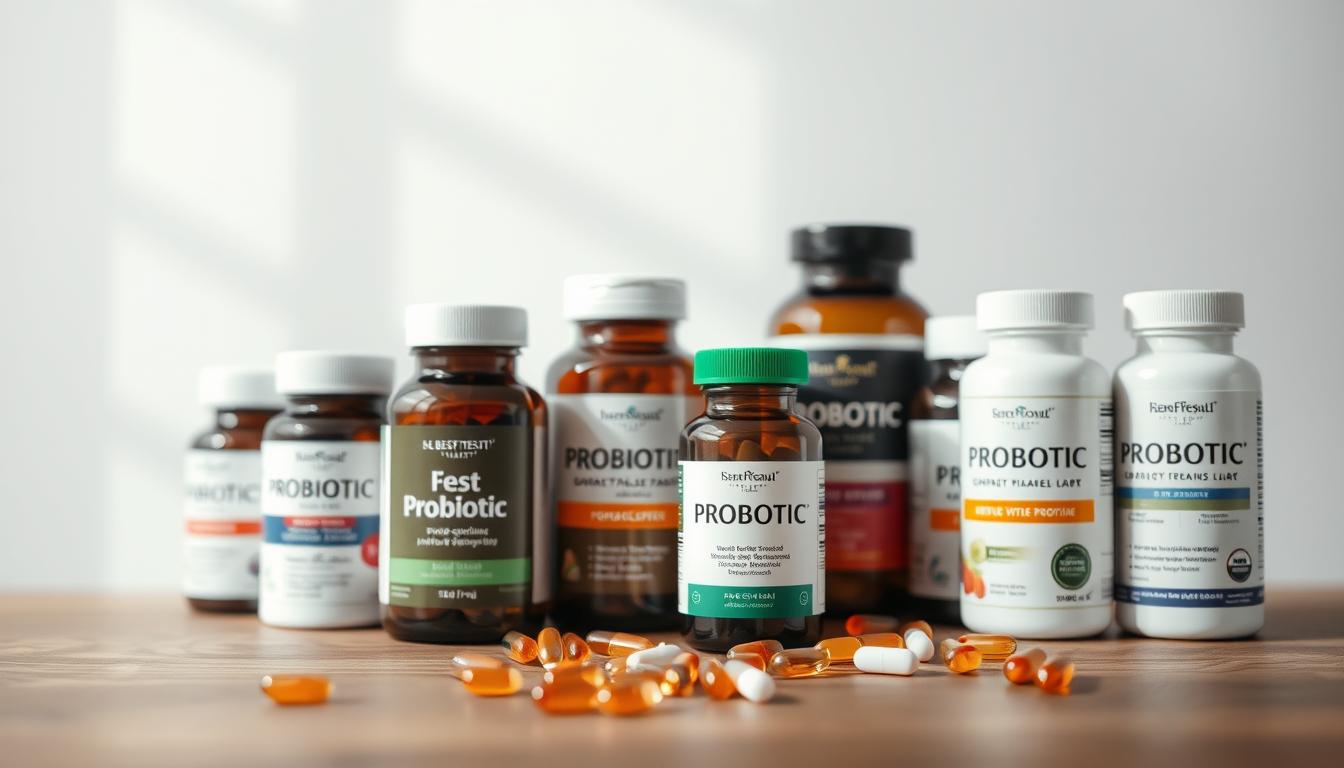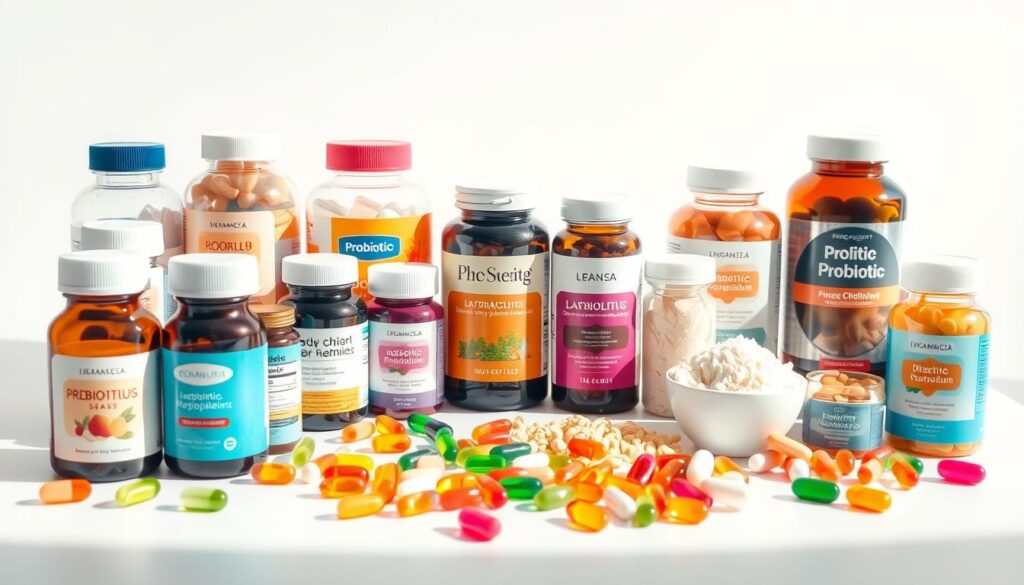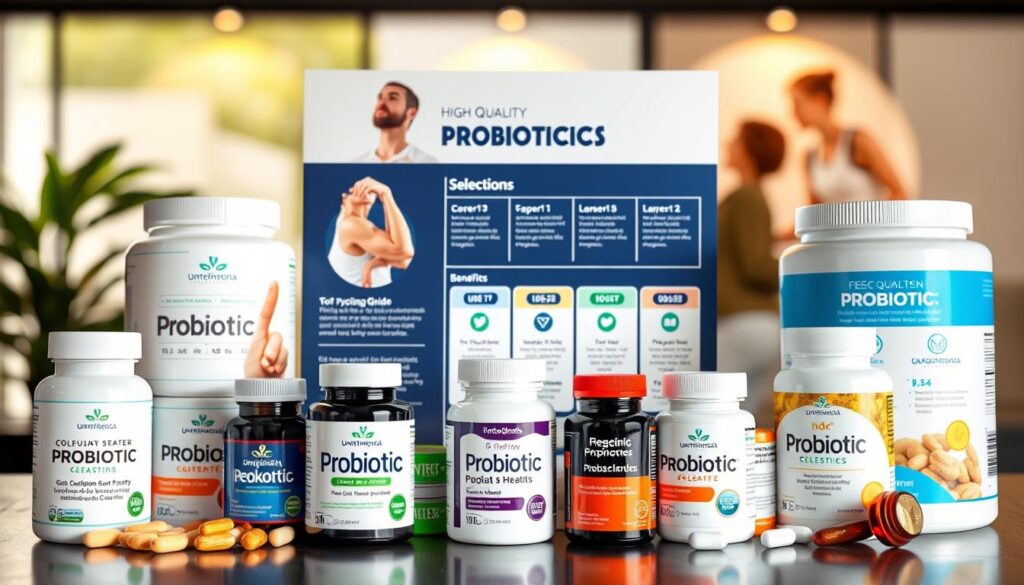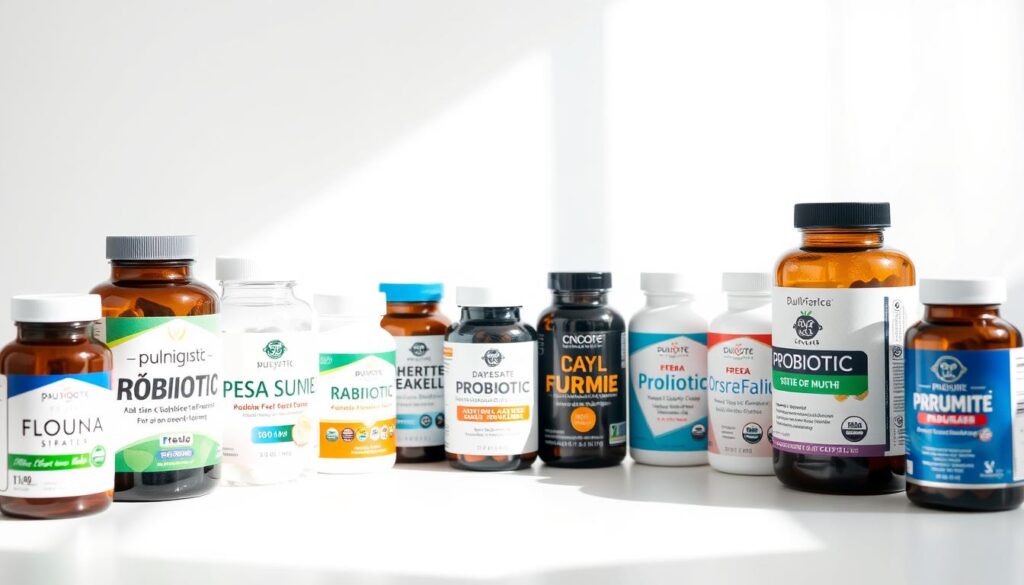Best Probiotic Supplements – Tested & Reviewed

You wake up feeling bloated again. Your stomach churns as you reach for your morning coffee. If this sounds familiar, you’re not alone. Millions of Americans struggle with digestive discomfort every single day.
The solution might be simpler than you think. The best probiotic supplements can transform your gut health. They can change how you feel from the inside out.
Your gut is home to trillions of tiny microorganisms. These microscopic workers include bacteria, viruses, and fungi. They work together to digest your food and keep you healthy.
When the balance between good and bad bacteria tips the wrong way, you might face digestive issues. You might also have weak immunity or frequent infections. Finding the right probiotics for gut health can restore this delicate balance.
The search for top rated probiotics can feel overwhelming. Store shelves overflow with countless brands promising miraculous results. You need reliable information to make the right choice for your body.
Whether you’re looking for adult health support, specific formulas for women’s health, or gentle options for pediatric health. The right probiotic supplement exists for your unique needs.
Key Takeaways
- Your gut contains trillions of microorganisms that affect your overall health
- An imbalanced gut microbiome can cause digestive problems and weaken immunity
- The best probiotic supplements help restore healthy bacteria balance
- Different probiotics work better for adult health, women’s health, and pediatric health
- Top rated probiotics contain specific bacteria strains at recommended levels
- Choosing probiotics for gut health requires understanding your individual needs
What Are Probiotics and Why Are They Important?
Probiotics are live microbes that help your health when eaten in the right amounts. The International Scientific Association for Probiotics and Prebiotics calls them tiny helpers. They are mostly bacteria like the good ones in your gut.
Understanding Gut Health
Your gut is home to trillions of microbes that are key to your health. They help with digestion and even your mood. But, if the balance of good and bad bacteria gets off, you might feel sick or weak.

Benefits of Probiotics
Probiotics do more than just help with digestion. They can:
- Provide relief from irritable bowel syndrome (IBS)
- Help manage ulcerative colitis symptoms
- Reduce acute infectious diarrhea
- Prevent antibiotic-associated diarrhea
- Boost immune system function
- Fight inflammation throughout your body
- Support healthy cholesterol levels
How Probiotics Work in the Body
Probiotics travel through your gut and live there for a bit. They fight off bad bacteria and keep your gut healthy. This helps your body work better and keeps you safe from sickness.
Types of Probiotic Supplements Available
Probiotics come in many forms to fit your lifestyle. Each type has its own benefits. This makes it easy to add good bacteria to your day.
Capsules
Probiotic capsules are very popular. They are easy to carry and don’t need preparation. They have freeze-dried bacteria that start working in your stomach.
There are different kinds of capsules. Some protect the bacteria from stomach acid. This helps the bacteria survive longer.
Powders
Powder supplements are flexible. You can add them to smoothies or food. They are great for kids who can’t swallow pills.
Many powders taste good, like vanilla or berry. This makes taking them a pleasure.

Fermented Foods
Fermented foods have probiotics naturally. Yogurt is a top choice, but there are others too. Kefir, kombucha, sauerkraut, kimchi, tempeh, and miso are all good sources.
But not all fermented foods have live cultures. Commercial pickles and sourdough bread often lose their probiotics.
| Supplement Type | Best For | Storage Needs |
|---|---|---|
| Probiotic Capsules | Travel and convenience | Room temperature or refrigerated |
| Powders | Children and mixing flexibility | Cool, dry place |
| Fermented Foods | Whole food nutrition | Refrigeration required |
How to Choose the Best Probiotic Supplement
Finding the right probiotic supplement can be tough with so many choices. Knowing about bacterial strains, potency, and quality is key. These tips will help you pick the best probiotics for women or men.
Strain Diversity
Each probiotic strain has its own benefits. Look for supplements with strains from these groups:
- Lactobacillus – supports digestive health and vaginal balance
- Bifidobacterium – aids nutrient absorption and immune function
- Bacillus – survives stomach acid better than other strains
- Saccharomyces boulardii – helps prevent diarrhea and supports gut health

CFU Count
CFU stands for Colony-forming units. It shows how many live bacteria are in each dose. Effective supplements have 1-50 billion CFU per serving. Your CFU needs depend on your health goals and gut health.
| CFU Range | Best For | Typical Use |
|---|---|---|
| 1-10 billion | Daily maintenance | General health support |
| 10-25 billion | Mild digestive issues | Occasional bloating or irregularity |
| 25-50 billion | Specific health concerns | After antibiotics or illness |
Quality and Purity
Quality is important when picking probiotics. Check the expiration date to ensure CFU counts are good. Keep your probiotics cold to keep the bacteria alive. Look for supplements with prebiotics like inulin to help the bacteria grow.
Top Probiotic Supplements of 2023
Finding the best probiotic supplements can feel overwhelming. There are many options out there. When looking for top rated probiotics, focus on quality brands.
These brands have been well-researched and tested. Store brands might be cheaper, but quality brands often give better results for your gut health.
Brand Comparisons
Leading probiotic brands are known for their commitment to quality. Companies like Culturelle, Align, and Garden of Life have strong reputations. They have done lots of clinical studies and product testing.
These manufacturers often focus on specific health conditions. This makes it easier to find solutions for your needs.

Ingredient Reviews
Not all probiotic strains are the same. Some yogurt products use Streptococcus thermophilus and Lactobacillus bulgaricus as starter cultures. But these strains can’t survive stomach acid well.
Look for products with proven strains like:
- Lacticaseibacillus rhamnosus GG (LGG)
- Bifidobacterium animalis lactis DN-173 010 (Bifidus regularis)
- Bifidobacterium longum 35624 (Bifantis)
Each strain has a unique name. This helps you know what you’re taking.
Overall Effectiveness
The best probiotic supplements have many well-researched strains. They also have enough colony-forming units (CFUs). Products that are tested by third parties and have clear labels are usually the most reliable.
When choosing top rated probiotics, look at the variety of strains. Also, check how transparent the manufacturer is about testing and quality standards.
Benefits of Regular Probiotic Use
Regular probiotics can change your health in amazing ways. These tiny helpers work hard in your gut. They make big changes that go beyond just digestion.
When you take probiotics often, your body gets better in many ways. This helps you feel your best overall.
Digestive Health
Probiotics help your intestines stay balanced. They make compounds that feed your gut lining. This helps you digest food better and can make you feel less bloated.
They also keep bad bacteria from taking over. This means you absorb nutrients better and have regular bowel movements. Many people feel less gas and cramps after a few weeks.
Immune Support
Your gut is home to about 70% of your immune system. Probiotics make your gut stronger. They help your body fight off bad stuff and keep the good stuff in.
| Immune Benefit | How Probiotics Help |
|---|---|
| Infection Prevention | Block pathogenic bacteria from colonizing |
| Inflammation Control | Regulate immune response and reduce overreaction |
| Antibody Production | Stimulate creation of protective antibodies |
Mood and Mental Well-Being
Probiotics can affect your mood. They make neurotransmitters and talk to your brain. This can help you feel less anxious and more stable.
Studies show some probiotics help with emotional balance. They reduce inflammation and help make chemicals that improve your mood.
Common Myths About Probiotics
When looking for the best probiotic supplements, you’ll find many claims. It’s important to know what’s true and what’s not. This will help you make better choices when reviewing probiotic supplements.
Can You Overdose on Probiotics?
Many worry about taking too many probiotics. But, you can’t overdose on these good bacteria. Your body gets rid of extra probiotics through digestion.
Most healthy adults can safely take billions of CFUs every day. But, very high doses might cause discomfort like bloating. Start with small amounts and increase as needed.
Are All Probiotics the Same?
This is a big myth in probiotic reviews. Each probiotic strain is different. For example, Lactobacillus rhamnosus helps with skin, while Lactobacillus acidophilus helps with digestion.
Think of probiotic strains like different vitamins. Each has its own purpose. When picking the best probiotics, choose strains that fit your health goals.
Probiotics and Weight Loss
Some probiotics might help with metabolism, but they’re not for losing weight alone. Strains like Lactobacillus gasseri might help with weight when diet and exercise are also part of the plan. Probiotics are best when used as part of a healthy lifestyle.
Potential Side Effects of Probiotics
Most people do well with probiotics for gut health. But, you might feel some mild side effects when starting a new supplement. Knowing about these effects helps you tell normal reactions from serious ones. This review will tell you about possible side effects.
Common Reactions
When you start probiotics, your gut needs time to adjust. You might feel:
- Bloating and gas in the first few days
- Changes in how often you go to the bathroom
- Mild stomach discomfort
- Temporary thirst
These signs mean the probiotics are working. Your body usually gets used to them in one to two weeks. Up to 30% of people taking antibiotics have digestive problems. That’s why probiotics are important during antibiotic treatment.
When to Consult a Doctor
If you have severe symptoms or are in a high-risk group, stop taking probiotics and see a doctor. The American Gastroenterological Association says not to use probiotics in certain cases:
- If your immune system is weak
- During chemotherapy
- After surgery
- When you’re very sick
- For kids with acute gastroenteritis
Allergic reactions like rash, itching, or trouble breathing are serious. Call your doctor right away if you have these symptoms. This review stresses that while probiotics are usually safe, some people need to be more careful.
How to Incorporate Probiotics into Your Diet
Adding probiotics for digestion to your daily routine is easy. You can get them from food and supplements. It’s important to find what fits your lifestyle and health goals.
Probiotic-Rich Foods
Fermented foods are full of probiotics. They help with more than just gut health. They can lower inflammation, improve cholesterol, and boost your immune system. Here are some best probiotics for women and men:
- Yogurt with live cultures
- Kefir
- Sauerkraut
- Kimchi
- Miso soup
- Tempeh
- Kombucha
Daily Supplement Tips
If you’re on antibiotics, start probiotics two days after. This helps avoid diarrhea. Take your supplement at the same time every day for a routine.
Pairing with Prebiotics
Prebiotics feed probiotics for digestion in your gut. They help these good bacteria grow and work better.
| Prebiotic Foods | Serving Size | Fiber Content |
|---|---|---|
| Garlic | 1 clove | 0.2g |
| Asparagus | 1 cup | 2.8g |
| Green bananas | 1 medium | 3.1g |
| Artichokes | 1 medium | 10.3g |
Eating fresh fruits, veggies, and fiber can cut down on probiotic needs. Start with whole foods, then add supplements if needed.
Where to Buy Quality Probiotics
Finding good probiotic pills needs careful shopping. These supplements aren’t FDA-regulated. Companies can sell many products as probiotics without strict standards.
You can find quality options through different places. Each has its own benefits for finding the best probiotics for men and other special formulas.
Online Retailers
Shopping online gives you a wide range of probiotics. Amazon has thousands of options with reviews to help you choose. Sites like iHerb and Vitacost carry top brands.
Direct from the manufacturer’s websites, you get detailed product info and guarantees of authenticity.
Health Food Stores
Local health stores offer personal service when picking probiotic pills. Whole Foods Market has live cultures in the fridge. GNC and Vitamin Shoppe have staff ready to suggest strains.
These stores carry trusted brands. You can check labels before buying.
Popular Brands
Many well-known makers create high-quality probiotics:
- Garden of Life – Known for diverse strain formulas
- Culturelle – Features clinically studied Lactobacillus strains
- NOW Foods – Offers affordable options including best probiotics for men
- Jarrow Formulas – Specializes in targeted probiotic blends
When shopping, look for CFU counts at expiration, not manufacture date. This means you get live, helpful bacteria for your health goals.
Customer Reviews and Success Stories
Real people share their powerful experiences with top rated probiotics. They talk about how these supplements changed their lives. From better digestion to overall wellness, users have seen amazing results.
Testimonials from Users
Sarah from Texas had digestive issues for years. She found relief with a probiotic supplement. She felt more energetic and had regular digestion in just two weeks.
Mark, a 45-year-old teacher from California, found relief from stomach discomfort. His story is like many others. They all say the right strain made a big difference.
Before and After Experiences
Users often see big changes in their lives with probiotics. They report:
- Less bloating and gas in 7-14 days
- Better sleep in one month
- Improved mood and mental clarity
- Stronger immune system during cold season
Clinical studies back up these personal stories. Research shows certain strains, like Lactobacillus rhamnosus GG, help with digestion. Many users in our review database have seen these results too.
Future Trends in Probiotic Supplements
The probiotic industry is at a thrilling point. New rules and discoveries are changing how probiotics will look on store shelves. Right now, companies only list the total weight of microorganisms. This makes it hard to know how many live bacteria you get.
The industry wants clearer labels. They want to show how many live bacteria are in CFUs (colony-forming units).
Innovations to Watch
Scientists are making personalized probiotic blends. These blends match specific strains to your gut’s needs. Smart packaging is coming to keep bacteria alive longer.
Temperature-sensitive labels will show if your probiotics stayed fresh. Time-release capsules are being improved. They will deliver bacteria right where they need to go in your digestive system.
Research Developments
New studies show probiotics affect your body in surprising ways. They can influence hormone production and nerve signals between your gut and brain. Scientists are testing specific bacteria for treating high cholesterol and obesity.
Clinical trials are looking into how probiotics manage inflammatory bowel disease. Each strain works differently. Some produce anti-inflammatory compounds, while others strengthen your intestinal barrier.
Expanding Market Trends
The probiotic market is growing beyond just digestive health. Soon, you’ll find probiotics for skin health, athletic performance, and stress management. Food companies are adding beneficial bacteria to products like chocolate and coffee.
The global probiotic market is expected to hit $100 billion by 2030. This growth means better quality, lower prices, and more choices for you.
